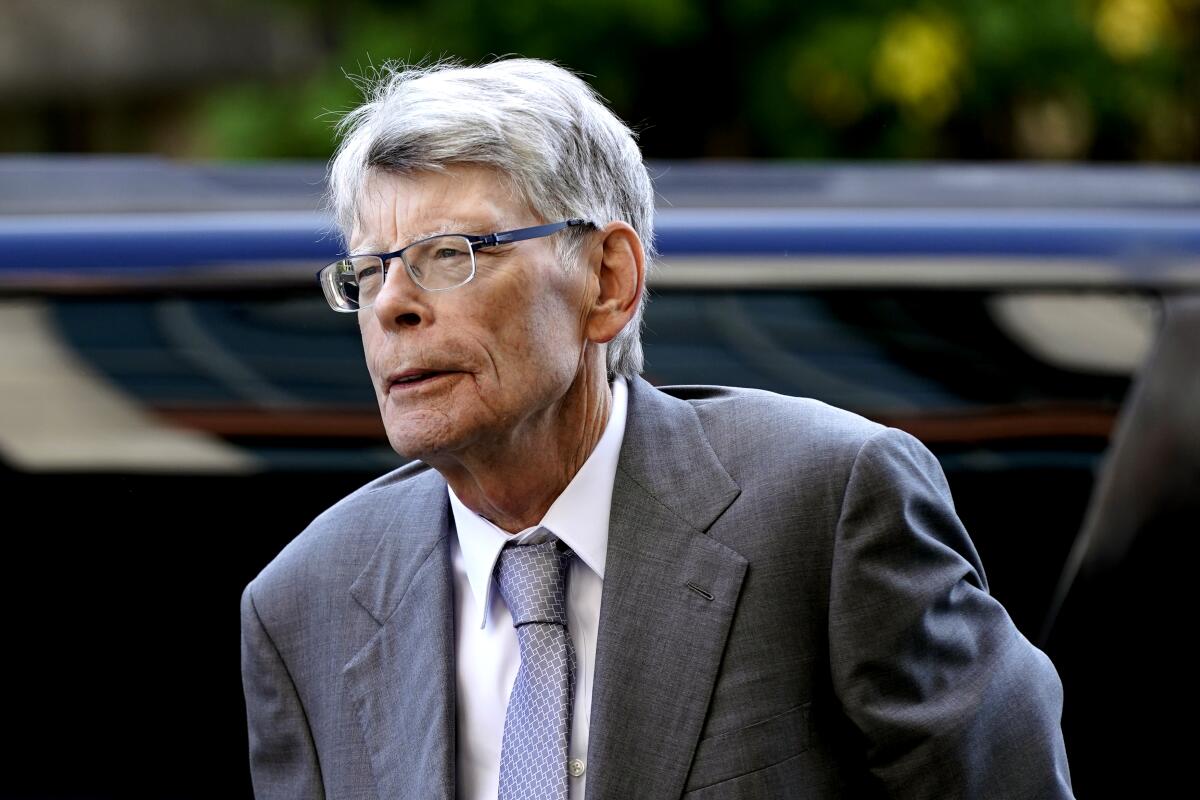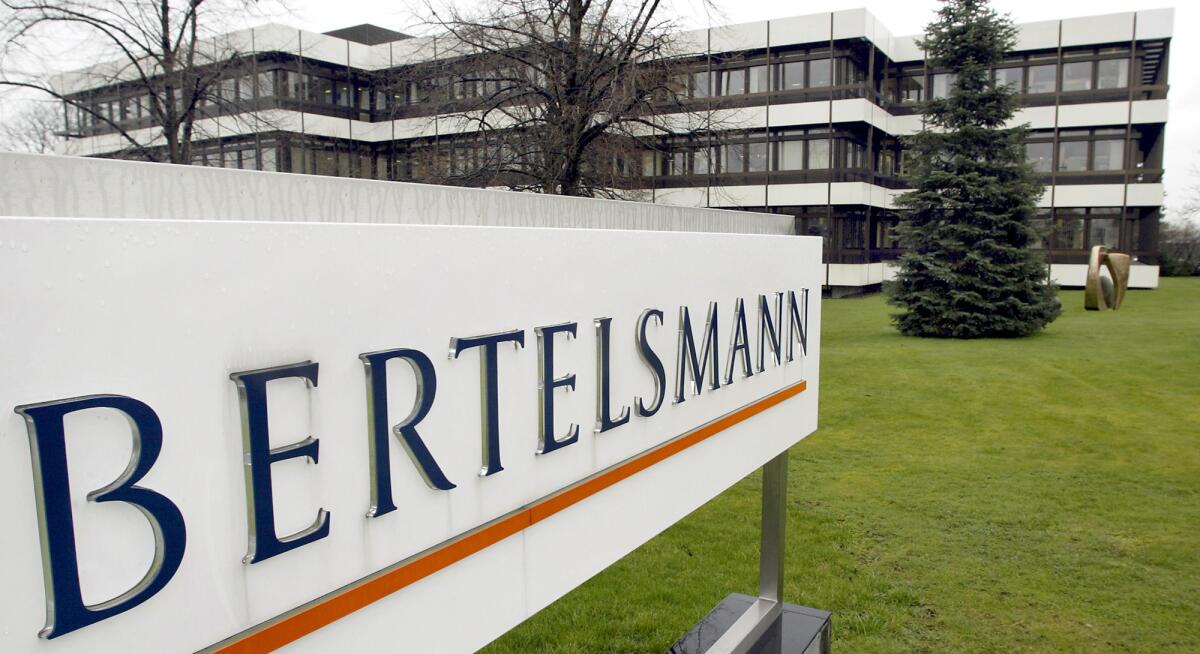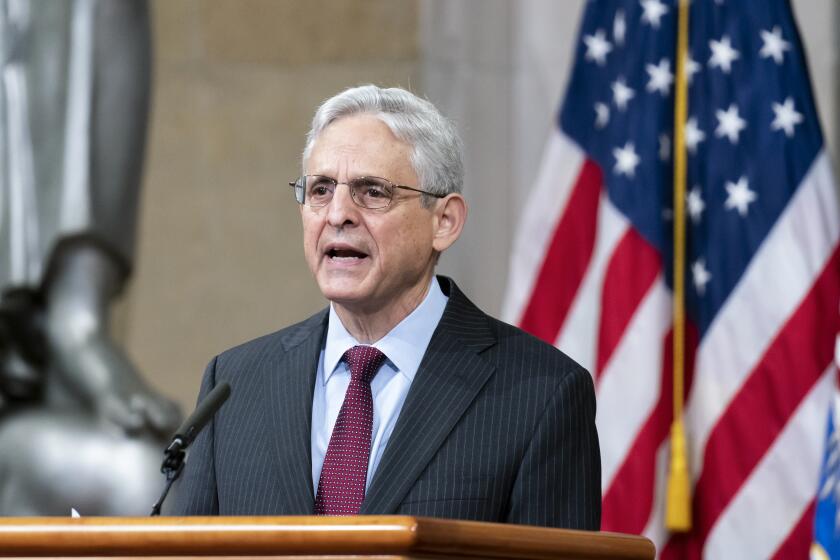Stephen King testified against publishing’s biggest merger. What you need to know about the antitrust trial

- Share via
The biggest antitrust trial to hit the publishing industry in recent memory kicked off this week, and today the King of horror had his day in court.
On Monday, Penguin Random House, the largest publisher in the country, entered a federal courthouse in Washington to defend its deal to acquire Simon & Schuster, the fourth largest, against a Department of Justice emboldened under President Biden to enforce antitrust laws aggressively.
If Judge Florence Y. Pan rules in the publisher’s favor, the merger would drastically change the publishing world, whittling down the number of major publishing houses, known as the Big Five, to four. The question Pan is deciding is whether, as the DOJ argues, this will curtail competition and suppress book advances for high-earning authors.
ViacomCBS has announced plans to sell Simon & Schuster to publishing giant Penguin Random House LLC for a whopping $2.18 billion next year.
Testifying for the government on Tuesday was Stephen King, one of the most successful and prominent novelists in the world. Author of bestsellers including “The Shining’’ and “The Stand,” King has been publicly critical of the deal and openly objected to the involvement of his longtime publisher, Simon & Schuster.
How did it come to this pass? It all began in November 2020, when Paramount Global (formerly known as ViacomCBS) announced it had agreed to sell Simon & Schuster to Bertelsmann’s Penguin Random House for $2.18 billion. Last fall, the Department of Justice sued to block the deal on the grounds that too much consolidation was bad for authors and, ultimately, for readers.
Other witnesses in the trial, expected to last roughly three weeks and be decided in November, include Simon & Schuster’s Chief Executive Jonathan Karp, Penguin Random House Chief Executive Markus Dohle and other authors, agents and executives from other publishing houses.
Here’s what King said today and what you need to know about publishing’s unprecedented antitrust lawsuit.
Penguin Random House and Simon & Schuster are putting up a fight against federal efforts to scuttle their merger, alleging the government is wrong.
What did Stephen King have to say?
“I came because I think that consolidation is bad for competition,” King said Tuesday in front of a full courtroom (and an overflow room nearby). “That’s my understanding of the book business. The more companies there are, the better it is.”
During 45 minutes of testimony, King laid out the changes he’s witnessed over a half-century career in collaboration with a number of different publishers. He described independent publishers becoming increasingly “squeezed” by conglomerates. “The reason they’re being squeezed is because they don’t get the shelf space that they used to because the majors take a lot of that shelf space.”
He described his early years with indie publishers as the glory days, recalling his phone ringing nonstop during auctions as his agent fielded offers from smaller publishers. But he eventually migrated to what’s now become the Big Five because of their wider distribution networks and deeper pockets.

“I was able to pay the mortgage and I was able to put money away for the kids’ education,” said King. “I didn’t have to finance the car. As far as I was concerned, I was living the dream: I was writing full time. I enjoyed what I was doing. That was a big deal.... There comes a point where if you’re very, very fortunate, you’re able to stop following your bank account and start following your heart. And that’s what I did. It was wonderful and it was great.”
But most writers today aren’t so fortunate. The average author only makes around $20,300, which is below the poverty line, said King, citing a 2018 Authors Guild survey. He put the blame for shrinking advances squarely on industry consolidation.
“There were literally hundreds of imprints and some of them were run by people who had extremely idiosyncratic tastes,” he added. “Those businesses, one by one, were either subsumed by other publishers or they went out of business.”
The dynamics, he argued, have reversed; big business isn’t helping the next generation of Stephen Kings. “I think that it becomes tougher and tougher for writers to find enough money to live on.”
U.S. regulators sue to block a $2.2-billion book publishing deal that would reshape the industry, saying consolidation would hurt authors and readers.
Why is the merger such a big deal?
The New York-based Simon & Schuster and Penguin Random House are among the largest publishing houses in the country, known in the publishing world as the Big Five. (The other three are Hachette, HarperCollins and Macmillan).
Penguin Random House is the result of another megamerger, between Random House and Penguin, in 2013 (at which point the Big Six became the Big Five). Penguin’s roster of blockbuster authors, who generate enormous sales of “backlist” titles, includes John Grisham, Toni Morrison, Dan Brown and former White House occupants Bill Clinton and Barack and Michelle Obama — all of whom have sold millions of copies worldwide.
Simon & Schuster has leaned in recent years toward big nonfiction, publishing heavyweight writers such as Bob Woodward and Hillary Clinton. If the merger goes through, the Big Five would shrink to the Big Four — one of them significantly larger than the rest.
Why is the Biden administration fighting it?
The government argues that the merger would reduce market competition and ultimately harm writers. If the deal goes through, the merged company would control nearly 50% of the bestseller market, which would ultimately result, the DOJ contends, in authors receiving smaller advances and worse contract deals. “[F]ewer authors will be able to earn a living from writing,” the DOJ argued in a pretrial brief.
Collectively, the Big Five make up 90% of the market for bestselling books in the U.S., according to the government’s court filing.
“The proposed merger would further increase consolidation in this concentrated industry, make the biggest player even bigger, and likely increase coordination in an industry with a history of coordination among the major publishers,” the filing said.
The DOJ also argues that readers will inevitably be harmed. “[B]y reducing author compensation, the quantity and variety of books published will fall as well… reducing author compensation will likely reduce the output of books published and limit consumer choice by limiting what stories readers hear.”
Biden searches for an antitrust enforcer who could radically transform the U.S.
How are the publishers defending the deal?
Penguin and Simon & Schuster say, to the contrary, that the merger would bolster competition in the publishing industry and allow them to pay authors more. “[B]y making the combined entity a stronger bookselling competitor, the merger will incentivize other publishers to compete even harder for consumer attention,” the publishers said in their pretrial briefing.
This argument relies on a common piece of logic in publishing — that the growing dominance of Amazon in bookselling makes it even more necessary for publishers to consolidate, the better to set terms with the online retail behemoth from a position of strength.
They also contend that a larger, more efficient company would reduce book prices, ultimately benefiting readers, booksellers and authors.
The publishers criticized the government’s focus on anticipated bestselling books — the 1,200 or so books purchased every year for author advances of at least $250,000. At 2%, they make up a tiny piece of all the books published by commercial companies.
Moreover, the publishers say they will continue to operate independently and be allowed to bid against each other for books, maintaining competition among the imprints within the conglomerate.
On Tuesday, Karp, Simon & Schuster’s CEO, pushed back against the government’s emphasis on auctions between his company and Penguin Random House that had raised advances, noting the many auctions he’d lost to other publishers as well.
Asked whether the Big Five had an insurmountable marketing advantage, Karp said, “I think that that is a prevailing piece of conventional wisdom and I’m not going to disagree,” before adding, “I do think that a lot of us believe that a good editor, a good publicist, and a sales rep is enough.”

What’s at stake, according to a lawyer
Many market-watchers are looking at this trial as a test of the Biden administration’s resolve against corporate consolidation.
“There has been a lot of criticism over the years about the government being too willing to take settlements in merger cases and not stopping mergers fully,” said Harry First, a law professor at New York University.
“It’s one thing to give speeches about policies, it’s another thing to go into court and actually litigate and win cases,” he added.
The government’s focus here on the labor market rather than consumers is also an interesting one, he said — one that’s consistent with the Biden administration’s emphasis on improving conditions for workers.
“[A]ntitrust enforcement is one aspect of that,” said First. “This is not quite the first test of this, but it’s the first test of this in a merger setting for this administration, so that also makes this an important case to watch.”
So what’s at stake for the publishers? A lot of money. When the deal was announced in 2020, Simon & Schuster owner ViacomCBS told The Times that German conglomerate Bertelsmann, which owns Penguin, agreed to pay a termination fee if the deal was blocked, but wouldn’t disclose its size. If the merger doesn’t go through, Simon & Schuster will have to find an alternate buyer.
How unusual is the lawsuit?
Although the publishing industry has steadily consolidated over the years, the trend has accelerated in recent years. There was the Penguin-Random House merger in 2013, and just last year, two publishing houses made major acquisitions: HarperCollins purchased Houghton Mifflin Harcourt’s trade book branch for $349 million, and Hachette Book Group bought Workman Publishing for $240 million, according to a court filing.
Previous major mergers have sailed past regulators with relatively little resistance. A change in the weather at the DOJ portends a landscape in which consolidation may not always be a given.
Dorany Pineda reported from Los Angeles. Freddy Brewster from Washington D.C.
More to Read
Sign up for our Book Club newsletter
Get the latest news, events and more from the Los Angeles Times Book Club, and help us get L.A. reading and talking.
You may occasionally receive promotional content from the Los Angeles Times.















